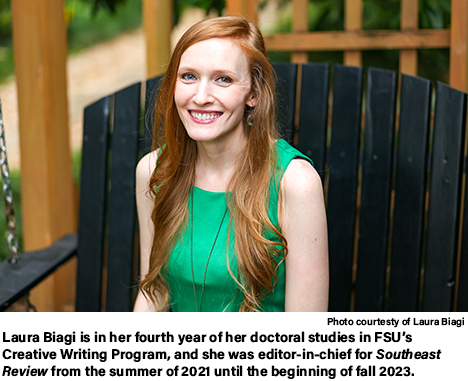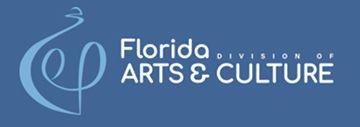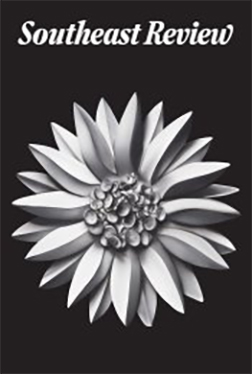Laura Biagi and Southeast Review staff accomplish goal to earn Specific Cultural Project Grant from Division of Arts and Culture
When Laura Biagi became editor-in-chief for Southeast Review in the summer of 2021, she established several long-term goals for the national literary magazine housed in Florida State University’s English department.
Working with a team of fellow graduate students who edit and manage the magazine, Biagi achieved many of her aspirations by the time she stepped down  from the top role at the beginning of the Fall 2023 semester. News she received in the summer of 2023 fulfilled perhaps the most significant objective she had on her to-do list.
from the top role at the beginning of the Fall 2023 semester. News she received in the summer of 2023 fulfilled perhaps the most significant objective she had on her to-do list.
The Florida Department of State’s Division of Arts and Culture awarded a $25,000 Specific Cultural Project Grant to Southeast Review, money that will help the magazine grow even stronger under the guidance of new editor-in-chief Natalie Tombasco and her staff.
“We got the grant contract at the beginning of July, and it was enormously exciting,” says Biagi, who is in her fourth year of her doctoral studies in FSU’s Creative Writing Program. “We had worked so hard to make this happen. The grant is a huge opportunity for launching the magazine into greater opportunities, helping it grow, increasing its reputation and audience reach, and expanding the kinds of ways we can give back to our local and national and international communities.”
The process to the confirmation that Southeast Review had been selected was a long one. Biagi submitted the Discipline-Based Literature application in June 2022. A committee of reviewers for all the Division of Arts and Culture grants then met with applicants to ask questions and to hear feedback from the organization.
“It was a bit of a nerve-racking panel when I attended because I was hearing how all the other applicants were doing,” Biagi says. “For first-time grantees, as we were, getting funding is typically more difficult.”
Two of the reviewers had to recuse themselves from voting on Southeast Review’s application because of conflicts: FSU English Professor Virgil Suárez and another person, who had recently submitted work to the magazine. The committee eventually determined scores for each applicant, and those above a certain threshold would be included in the state budget to be funded.
“Luckily we got a score that moved us on,” Biagi says. “After that point, the next step was to wait until the legislature met and hope they approved all of the Division of Arts and Culture grants for the state budget, or at least that we would make the cut-off if they only chose to fund some of the grants.”
 The 2023 legislative session ended in May 2023 with funding for all the Specific Cultural Projects, numbering a total of 151, with seven in Leon County. The final obstacle was Florida Gov. Ron DeSantis signing off on the budget—with no last-minute line-item vetoes—which he did in mid-June.
The 2023 legislative session ended in May 2023 with funding for all the Specific Cultural Projects, numbering a total of 151, with seven in Leon County. The final obstacle was Florida Gov. Ron DeSantis signing off on the budget—with no last-minute line-item vetoes—which he did in mid-June.
The magazine, founded in 1979, publishes underrepresented and emerging writers and has won numerous awards. Although there was tough competition for the grant, Biagi felt confident entering the mix.
“We consider ourselves pretty unique in Florida, as a strong, long-running literary magazine that publishes diverse writers from across the U.S. and world and has a social justice advocacy focus,” she says.
The grant proposal highlighted those qualities as well as the masthead’s volunteerism for a range of initiatives and fundraisers that round out the full spectrum of programming. For example, Biagi emphasized in the application other ways that Southeast Review champions social justice advocacy, such as the incarcerated writers workshop.
Former nonfiction editor and 2021 FSU English doctoral alumna Dyan Neary started the initiative in 2019, which was loosely affiliated with Southeast Review in its beginning. Biagi and Amanda Hadlock, who was the magazine’s assistant editor during Biagi’s tenure, reshaped the workshop, with Hadlock leading the committee to facilitate that process. Hadlock graduated from FSU in Spring 2023 with her Master of Fine Arts in English-Creative Writing.
Another program Biagi featured in the grant application was the Writer’s Regimen, which was relaunched during the summer of 2022 and is described as “a place where we connect and engage with our literary community through writing prompts, craft talks, and other writing inspiration.”
“The intention of the grant was to fund all of these projects, particularly via paying our contributors more and paying our masthead, something we’ve never been able to do before this,” she adds. “It was a big deal to be able to say, if we’re funded, we’ll be able to significantly make a difference in how our magazine operates.”
 In an email announcement about the award, FSU Distinguished Research Professor of English and Associate Chair for Graduate Studies Mark Winegardner wrote, “I particularly want to spotlight and thank Laura Biagi for her initiative and (characteristic, exemplary, indefatigable) hard work on this. I'm pretty sure it's the biggest grant SER has won in its 44-year history.”
In an email announcement about the award, FSU Distinguished Research Professor of English and Associate Chair for Graduate Studies Mark Winegardner wrote, “I particularly want to spotlight and thank Laura Biagi for her initiative and (characteristic, exemplary, indefatigable) hard work on this. I'm pretty sure it's the biggest grant SER has won in its 44-year history.”
Biagi, however, is quick to point out that this accomplishment would not have occurred without help from the magazine's entire staff.
“Our poetry, fiction, nonfiction, and art teams consistently find bold, stellar work to publish in each issue and online, as do our interviews and book reviews teams,” she explains. “Our production team puts together truly gorgeous print biannual issues, and our online editor is excellent at putting up our online exclusives. Our interns support our work in all of this and help us keep our social media lively and exciting.
“Our masthead is what makes our magazine stand out time and time again.”
Biagi says that although she is not comfortable talking about winning the grant as a personal achievement, she does feel proud of what she has done during her time as editor in chief, especially applying for grants and pursuing ways to increase pay for the masthead and Southeast Review’s contributors.
“The amount of hours I’ve put into the magazine over the past two years is perhaps not always wise, given that I came to FSU to focus on my writing, and so the grant feels in many ways like a lot of hard work paying off,” Biagi says. “Each time a new publication comes out, whether a biannual release or an online exclusive, and each time we put on another successful event or program, there’s a new reason to celebrate everybody’s hard work.”
She also recognizes that the $25,000 will allow Southeast Review to continue setting and achieving goals but on a larger scale.
“My hope is it will keep leading to greater and greater things for the magazine,” Biagi says. “It’s exciting to point to that as something tangible that I was able to help make happen.”
Follow the English department on Instagram; on Facebook; and on X.
